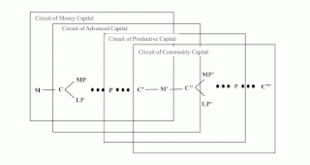This is the start of Section 5, "Strikes and combinations of workers", in the second chapter of The Poverty of Philosophy: "'Every upward movement in wages can have no other effect than a rise in the price of corn, wine, etc., that is, the effect of a dearth. For what are wages? They are the cost price of corn, etc.; they are the integrant price of everything. We may go even further: wages are the proportion of the elements composing wealth and consumed reproductively every day by the...
Read More »Value And Distribution
"It is the whole process of production that must be called 'human labour', and thus causes all products and all values. Marx and Ricardo used 'labour' in two different senses: the above and that of one of the factors of production ('hours of labour' or 'quantity of labour' has a meaning only in the latter sense). It is by confusing the two senses that they got mixed up and said that value is proportional to quantity of labour (in second sense) whereas they ought to have said that it is due...
Read More »The Spread Of Marxism: A Riddle
Karl Marx died on 14 March 1883. Less than 15 people attended his funeral, and Engels gave an eulogy. Marxists existed, a century later, in every country on the face of this planet, and most had political parties, some powerful, that claimed to follow Marx. How did this change from obscurity to world-wide recognition come about? What did Marx have to say that was so persuasive? If economics were a serious subject, these questions would be explored within academic economics departments....
Read More »Engels To Bloch in 1890
Engels had a lot to do with formulating orthodox interpretations of Marx in the period after Marx's death. So it is interesting to see what he says. I have transcribed another letter before, about the law of value. The following is about historical materialism and the relation of the superstructure to the economic base: According to the materialist conception of history, the ultimately determining element in history is the production and reproduction of real life. Other than this...
Read More »Mr. Etcetera
Mr. Etcetera The subtitle of T. R. Malthus’s Essay on the Principle of Population advertised its inclusion of “remarks on the speculations of Mr. Godwin, M. Condorcet, and other writers.” In volume I of Capital, Marx did not mention William Godwin’s name. One might say, rather, that Marx studiously avoided mentioning Godwin. He did, however, engage in a sustained disparagement of Malthus — particularly his essay on population. This alone would...
Read More »The Four Circuits Of Capital
The Four Circuits of Capital Marx describes three circuits of capital in the opening chapters of Volume 2 of Capital. But when I draw a diagram, as above, a fourth circuit seems to be missing. So I have added the circuit of advanced capital. The circuit of advanced capital begins with commodities, consisting of means of production and labor power, in the hands of or under the direction of capitalists. They have purchased these commodities with monetary advances. The capitalists, at this...
Read More »Ben Franklin, Proto Marxist
Ben Franklin was one the founding fathers of the United States. He participated in the constitutional convention. He was the first Postmaster General. He did experiments with electricity, when the Leyden jar was a new thing. There is a story about flying a kite in a thunderstorm. He also wrote about the wealth of nations: "Finally, there seem to be but three ways for a nation to acquire wealth. The first is by war, as the Romans did, in plundering their conquered neighbors. This is...
Read More »Socially Ambivalent Labour Time VIII: Capital, volume one, chapters 6, 7 & 8
Socially Ambivalent Labour Time VIII: Capital, volume one, chapters 6, 7 & 8 Chapter six, the buying and selling of labour power, contains neither “socially necessary labour time” nor “labour time socially necessary.” Instead it has a few synonyms: Suppose that in this mass of commodities requisite for the average day there are embodied 6 hours of social labour, then there is incorporated daily in labour-power half a day’s average social...
Read More »What Is Socially Necessary Abstract Labor Time?
To me, this is an easy question. SNALT, for a capitalist economy, is: L = a0 (I - A)-1y The notation is from Luigi Pasinetti's Lectures on the Theory of Production. The idea can be empirically applied with data from national income and product accounts (NIPAs), using techniques explained in, for example, Ronald Miller and Peter Blair's Input-Output Analysis
Read More »Some Difficulties In Reading Marx
"Let us take the process of circulation in a form under which it presents itself as a simple and direct exchange of commodities. This is always the case when two owners of commodities buy from each other, and on the settling day the amounts mutually owing are equal and cancel each other. The money in this case is money of account and serves to express the value of the commodities by their prices, but is not, itself, in the shape of hard cash, confronted with them. So far as regards...
Read More » Heterodox
Heterodox

